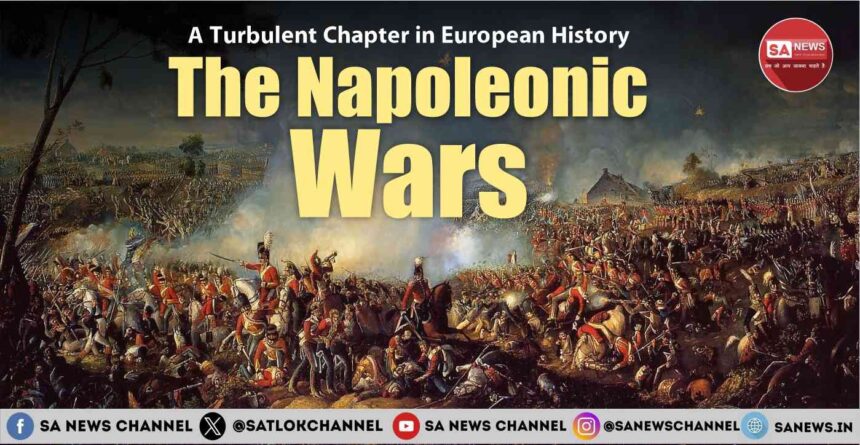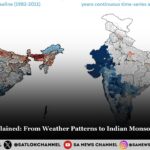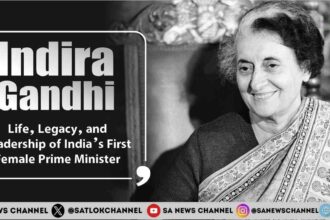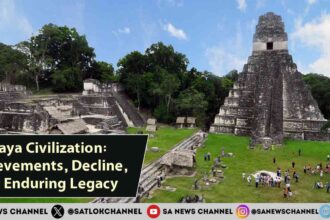The Napoleonic Wars, spanning from 1803 to 1815, marked one of the most intense and transformative periods in European history. Fueled by the ambitions of Napoleon Bonaparte and the revolutionary zeal of France, these wars reshaped not only the map of Europe but also the ideologies that governed nations.
- From Revolution to Empire
- The War of the Third Coalition (1805): A Display of Military Genius
- The Continental System and Naval Conflict
- The Peninsular War (1808–1814): Spain Becomes Napoleon’s Quagmire
- The Invasion of Russia (1812): The Turning Point
- The Sixth Coalition and the Fall of Napoleon (1813–1814)
- The Hundred Days and the Battle of Waterloo (1815)
- Impact on Europe and the World
- Napoleon: A Hero or a Tyrant?
- The Rise and Fall of an Empire
- Spiritual Perspective: Napoleonic Wars and the Eternal Truth
- Frequently Asked Questions about Napoleonic Wars
- 1. What were the Napoleonic Wars and when did they occur?
- 2. Why did Napoleon invade Russia, and what went wrong?
- 3. How did the Napoleonic Wars affect Europe?
- 4. What is the significance of the Battle of Waterloo?
- 5. Was Napoleon a hero or a tyrant?
- Connect With Us on the Following Social Media Platforms
What began as a French effort to defend its revolution quickly evolved into a continent-wide struggle involving every major European power. More than just military confrontations, these wars brought sweeping political, social, and cultural changes, the echoes of which can still be felt today.
From Revolution to Empire
The seeds of the Napoleonic Wars were sown during the French Revolution (1789–1799), a political earthquake that shook the foundations of monarchy across Europe. The revolution led to the overthrow of King Louis XVI, and with it came an ideological challenge to the established order. The old monarchies viewed revolutionary France as a dangerous threat that could inspire similar uprisings in their own lands.
This led to the formation of the First Coalition against France, a series of wars that laid the groundwork for the later Napoleonic conflicts.
As France battled its enemies, a young and brilliant general named Napoleon Bonaparte rose rapidly through the military ranks. His successful campaigns in Italy and Egypt earned him fame and public admiration. In 1799, he seized power through a coup d’état, eventually becoming First Consul and, later, Emperor in 1804. By then, France was no longer a republic in the revolutionary sense but had morphed into a military autocracy under Napoleon.
The War of the Third Coalition (1805): A Display of Military Genius
By 1805, the Third Coalition, consisting of Britain, Austria, Russia, and Sweden, had formed to curb Napoleon’s growing influence. Napoleon, in response, mobilized the Grande Armée, one of the most formidable military forces Europe had ever seen. His strategy focused on speed, deception, and concentrated attacks.

The highlight of this campaign was the Battle of Austerlitz, fought in December 1805 in present-day Czech Republic. Known as the “Battle of the Three Emperors,” it saw Napoleon decisively defeat the combined Russian and Austrian forces. His use of terrain, feigned weakness, and sudden flanking maneuvers demonstrated military brilliance. The victory solidified his dominance in continental Europe and led to the Treaty of Pressburg, forcing Austria to cede territory and bow out of the war.
The Continental System and Naval Conflict
Following his land victories, Napoleon sought to cripple Britain economically, recognizing that a direct invasion was impractical due to British naval superiority. In 1806, he introduced the Continental System, a large-scale embargo aimed at shutting British goods out of European markets. However, the strategy backfired in several ways.

While the system hurt British trade to some extent, it also disrupted economies across Europe, especially in France’s allied and occupied territories. Moreover, Britain responded with its own naval blockades, leading to widespread smuggling and dissatisfaction among Napoleon’s allies. The failure of the Continental System exposed a significant weakness in Napoleon’s grand strategy, he could not control the seas, and he struggled to enforce economic warfare on a continental scale.
The Peninsular War (1808–1814): Spain Becomes Napoleon’s Quagmire
In 1808, Napoleon made a critical error by invading Spain and placing his brother Joseph Bonaparte on the Spanish throne. What he anticipated as a quick conquest turned into a prolonged and brutal conflict known as the Peninsular War. The Spanish, with support from the British under the Duke of Wellington, waged a persistent guerrilla campaign against French forces.
This war bled France dry in both manpower and morale. It showcased that a superior army could be worn down by local resistance and unconventional tactics. The Peninsular War also served as a model for nationalist resistance, proving that occupation forces could be defeated by popular movements. It was the beginning of a slow decline for Napoleon’s empire, as it strained his military and divided his focus.
The Invasion of Russia (1812): The Turning Point
Perhaps the most catastrophic decision of Napoleon’s military career was his invasion of Russia in 1812. Tensions with Tsar Alexander I over the Continental System and mutual distrust led Napoleon to assemble a massive army of over 600,000 men, the largest in history at the time. Known as the Grande Armée, it crossed into Russian territory with high expectations.
However, the Russians employed a scorched-earth policy, destroying supplies and retreating deeper into their homeland. The French captured Moscow, but found the city largely deserted and set ablaze. Without sufficient food or shelter, and with the brutal Russian winter approaching, the Grande Armée began a disastrous retreat.
Only a fraction of Napoleon’s army survived. The loss shattered the illusion of his invincibility and emboldened his enemies across Europe. The Russian campaign marked the beginning of the end for Napoleon’s empire.
The Sixth Coalition and the Fall of Napoleon (1813–1814)
With Napoleon weakened, a new alliance formed: the Sixth Coalition, including Britain, Russia, Prussia, Austria, and several German states. The coalition forces gathered strength and defeated Napoleon at the Battle of Leipzig in 1813, also known as the Battle of Nations. This was the largest battle in European history prior to World War I, involving over half a million troops.
Also Read: The History of the Russian Empire: Rise, Expansion, and Collapse
After Leipzig, Napoleon retreated to France. The Allied forces pursued him, and by 1814, Paris was under siege. Facing overwhelming odds, Napoleon abdicated and was exiled to the island of Elba, off the coast of Italy. For the first time in over a decade, Europe saw peace returning, although it would be short-lived.
The Hundred Days and the Battle of Waterloo (1815)
In March 1815, Napoleon escaped from Elba and returned to France in a dramatic comeback known as the Hundred Days. Greeted by cheering crowds, he swiftly regained control of the French government. His return alarmed the European powers, who promptly formed the Seventh Coalition.
Napoleon’s final gamble ended at the Battle of Waterloo on June 18, 1815. Facing the Duke of Wellington’s Anglo-allied army and the timely arrival of Prussian forces under General Blücher, Napoleon’s army was decisively defeated. The loss was conclusive, Napoleon was captured and exiled to the remote island of Saint Helena in the South Atlantic, where he would live out the rest of his days.
Impact on Europe and the World
The Napoleonic Wars had profound consequences. Politically, they redrew the map of Europe. The Congress of Vienna (1815) was convened to restore order, balance power, and prevent the rise of another Napoleon-like figure. Monarchies were reinstated, and borders were reshaped, but the ideals of nationalism and liberalism had taken root.
Militarily, the wars revolutionized warfare. Mass conscription, corps systems, and rapid mobility became standard. Economically, the wars devastated much of Europe, but also triggered industrial innovation and modernization, particularly in arms and logistics.
Culturally, the Napoleonic era influenced art, literature, and philosophy. Figures like Beethoven and Goya expressed both admiration and horror at the events unfolding. The wars also planted seeds of revolution and national identity that would erupt throughout the 19th century.
Napoleon: A Hero or a Tyrant?
Napoleon Bonaparte remains one of history’s most controversial figures. To some, he was a brilliant military commander and visionary reformer. His Napoleonic Code modernized legal systems across Europe and continues to influence law today. He promoted meritocracy, secular education, and centralized administration.
To others, he was a warmonger and dictator who trampled on liberty and caused the deaths of millions. His conquests spread fear and destruction, and his ambition knew no bounds. The duality of Napoleon’s character, enlightened ruler and ruthless autocrat, still fuels debate among historians and thinkers.
The Rise and Fall of an Empire
The Napoleonic Wars were more than just a clash of armies, they were a clash of worldviews, ambitions, and the human spirit. Napoleon’s dazzling ascent to power showed how charisma, talent, and timing could change history. Yet his downfall proved just as dramatically that no individual, however brilliant, can stand above the collective will of nations and the natural law of balance.
While he redefined warfare and governance, his failure to temper ambition with humility led to suffering on a massive scale. From revolutionary roots to imperial dreams and ultimate exile, Napoleon’s journey mirrors the age-old truth that glory built without virtue cannot last. His story remains a compelling lesson for humanity on the dangers of unchecked power and the enduring need for spiritual wisdom.
Spiritual Perspective: Napoleonic Wars and the Eternal Truth
The fate of Napoleon Bonaparte mirrors a timeless pattern seen across history, when kings and rulers pursue ego, violence, and worldly power over righteousness, their downfall becomes inevitable. Ravan, despite being a great scholar and emperor of Lanka, was destroyed due to pride and unrighteousness. Kans, the tyrant king of Mathura, was slain despite his strength and armies. Similarly, Duryodhan from the Mahabharata met ruin for ignoring divine guidance.
Napoleon, like them, won many battles but lost the war of life. He ruled nations but failed to conquer his inner ego and attachment to temporary glory. The Chyren Saint Rampal Ji Maharaj ji teaches that all material achievements, kingdoms, power, fame are perishable. The only eternal attainment is liberation (Moksha), which comes from true devotion to the Supreme God Kabir, as described in our scriptures.
Whether ancient or modern, the lesson is the same: Without true spiritual knowledge and Satbhakti, even the greatest rulers fall. The lives of these kings warn humanity that only surrendering to a Tatvdarshi Sant and following the correct way of worship leads to eternal peace. Real victory is not on battlefields, but in attaining Satlok, the eternal abode beyond death and destruction.
In a world driven by ambition and temporary success, true peace remains out of reach. History reminds us that even the mightiest rulers, like Napoleon, were powerless before the law of karma and spiritual ignorance.
If your soul longs for everlasting peace, liberation from the cycle of birth and death, and true purpose, then it is time to seek refuge in the shelter of the Supreme God Sant Rampal Ji Maharaj. HE is not an ordinary Saint but the Eternal God Himself, descended in human form to deliver the forgotten truth of the scriptures.
HE does not promote blind rituals, but imparts evidence-based, scripture-backed spiritual knowledge (Tatvgyan). By following HIS guidance, one can attain Satlok, the immortal abode where there is no sorrow, no death, only eternal bliss. Listen to HIS divine discourses with an open heart, because even a single moment in HIS refuge can change your fate forever. Subscribe to Sant Rampal Ji Maharaj Ji on YouTube.
Frequently Asked Questions about Napoleonic Wars
1. What were the Napoleonic Wars and when did they occur?
The Napoleonic Wars were a series of major conflicts from 1803 to 1815, led by Napoleon Bonaparte as he sought to expand French dominance across Europe. They involved most of the major European powers and reshaped the continent’s political landscape.
2. Why did Napoleon invade Russia, and what went wrong?
Napoleon invaded Russia in 1812 due to a breakdown in relations with Tsar Alexander I and to enforce the Continental System. The campaign failed due to Russia’s scorched-earth tactics, harsh winter, and poor supply lines, resulting in catastrophic losses for the French army.
3. How did the Napoleonic Wars affect Europe?
The wars redrew national boundaries, led to the rise of nationalism, and influenced political ideologies like liberalism and conservatism. The Congress of Vienna in 1815 aimed to restore balance, but revolutionary ideas continued to spread.
4. What is the significance of the Battle of Waterloo?
Fought in 1815, the Battle of Waterloo marked Napoleon’s final defeat, ending his rule and the Napoleonic Wars. It led to his exile to Saint Helena and reestablished monarchical rule in France.
5. Was Napoleon a hero or a tyrant?
Opinions are divided. Some view Napoleon as a military genius and reformer who modernized Europe. Others criticize him as a power-hungry dictator whose wars caused immense suffering. His legacy remains complex and debated.









